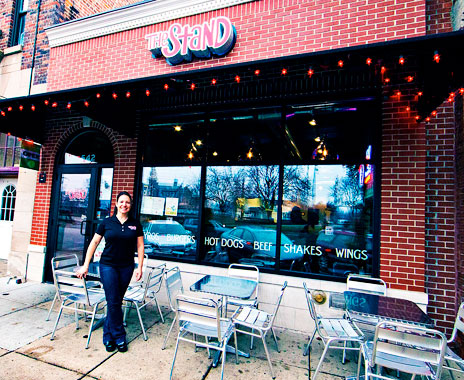Most restaurant openings contain rich backstories. Business models and financial projections seldom motivate individuals to pursue endeavors with 90 percent failure rates. In the world of quick service, this spirit of stubborn entrepreneurialism can often be experienced in its purest form by visiting new, independent restaurants and by spending time with the people who opened them.
Lisa Demos, owner/operator of The Stand in Glen Ellyn, Illinois, does not have access to focus groups, a six-figure marketing budget, or a Fortune 500 brand. But in its sixth month of operation, The Stand is already defying the odds through its winning combination of authentic Chicago-style fare, innovative restaurant design, and a genuine connection with its community.
Demos does not fit the profile of a typical restaurateur. A mother of three, her prior industry experience includes a stint in management at Olive Garden before her children were born. She’s not a foodie and admits to being an average home cook. Despite her relatively limited culinary background and the fact that she spent a decade removed from the workforce to raise her children, Demos had a valuable insight into the local food scene that would change the trajectory of her life, as well as her family’s.
“Downtown Glen Ellyn was really missing a fast-food, hamburger-hot-dog joint,” Demos says. “We needed a place where high-school students could hang out, and I saw an opportunity to bring that here.”
Demos selected a vacant, 100-year-old building in the village’s historic downtown district as the site of her future restaurant. The building most recently housed a print shop where Demos worked during college. While the site’s location was ideal, Demos’s first assignment as a restaurateur was launching a nine-month gut-rehab project to transform the early 20th century structure into the contemporary quick-serve restaurant she envisioned.
“I wanted to highlight the building’s character and create a cool, urban-loft look,” Demos says. “I wanted my patrons to feel like they had walked into a restaurant in downtown Chicago without leaving Glen Ellyn.”
Demos tapped Peter Stamos of Geostam Construction to lead the rehab project and help bring her vision to life.
“The rehab was a huge undertaking,” Demos says. “We started by tearing down the walls and floors. I hoped that there would be original brick under the plaster, and we got lucky. The brick was there and it was beautiful.”
While Demos is more football mom than flower child, she and Stamos examined every part of The Stand’s design, layout, equipment, and upholstery to find ways the restaurant could reduce its environmental impact and, in some cases, its operating costs.
“Throughout the conceptual development of the rehab, we always had an eye on sustainability,” Stamos says. “We tried to reuse as many materials as we could on the job and source as many sustainable materials as possible given the economics of the project.”
Some of their more interesting touches included harvesting sunlight through large skylights and incorporating a range of sustainable materials in the restaurant’s interior finishes. Some of the restaurant’s walls feature reclaimed wood sourced from Wisconsin forests and its staircase is framed by recycled, diamond-plate aluminum. The Stand’s patrons sit on chairs made of recycled composite material and wipe their hands with recycled napkins. The pair’s attention to detail is impressive.
“We recycled or reused 85 percent of the demolition debris recovered during construction,” Stamos says. “For example, we removed the building’s original drywall, pulverized it, and donated the end product for agricultural use. Farmers actually take that material and spread it over their fields.”
Stamos also installed a variety of high-tech equipment to reduce The Stand’s environmental footprint including: a “smart” hood exhaust system that automatically adjusts its fan level according to the restaurant’s temperature; a rooftop HVAC system that circulates fresh air rather than relying on coolants; special filters that extend the lifecycle of the oil used in deep fryers; and LED and florescent lighting. While all of the restaurant’s gadgets are a point of pride for Demos, her eyes light up when describing her washrooms—especially the sinks.
“I bring people into my restaurant just to check out my restrooms,” Demos says. “I’m not kidding. I’ve developed a reputation for having the nicest restrooms in town and so much of that has to do with my sinks.”
The Stand’s washrooms feature new all-in-one sinks called Advocate AV-Series Lavatory Systems, manufactured by Wisconsin-based Bradley Corporation. The Advocate enables users to complete the entire hand-washing process—soap, rinse, dry—in one place by combining a touchless soap dispenser, faucet, and hand dryer in a single unit.
Demos says the Advocate’s design conserves water, reduces electricity bills, and completely eliminates paper towel waste while keeping her washrooms cleaner throughout the day. It also maximizes the space of her single-capacity washrooms since patrons do not have to walk from the sink to the hand dryer.
“I don’t have to worry about water spilling on the floors or on the walls,” she says. “Everything goes down the drain and it helps me avoid maintenance nightmares.”
Demos and Stamos were recently honored by the Architectural Review Commission of Glen Ellyn for preserving the historic character of the original building during the rehab while creating an outstanding, contemporary design. (The trophy is proudly displayed in the restaurant adjacent to the soda machine.)
While The Stand’s design and location are pitch perfect, no quick serve can survive for long without delicious food and a great atmosphere. Fortunately, The Stand has both ingredients in spades.
The menu fuses Chicago-style classics—including hot dogs loaded with tomato, onion, neon-green relish, sport peppers, a pickle spear, celery salt, and mustard (no ketchup allowed) on poppy seed buns—with innovative fare that reflects the Demos family’s Greek heritage.
To create her Greek Style Chicken Wings, Demos dresses fried wings with a bright, acidic sauce comprised of olive oil, garlic, herbs, and lemon. The restaurant’s signature Stand Burger, grilled chicken sandwich, and milkshakes are customer favorites.
Aside from its chicken wings, The Stand’s biggest differentiator from its competition is the connection it has with its hometown. The restaurant is decorated with mini football helmets from the village’s Glenbard West High School team, where Demos’s eldest son William plays left guard and where her daughter Ann is a cheerleader. A big part of Demos’s motivation for opening the restaurant was to provide her children with an opportunity to learn life lessons through hands-on experiences and to employ other young people who might otherwise have a difficult time finding work given their school schedules.
“We have a lot of people working one day a week,” she says.
William can often be found managing shifts after school and Ann is an adept cashier. Demos’s youngest son, Zachary, chips in by manning the milkshake machine. During the lunch rush, the Demos family is surrounded by friends in the kitchen and across the counter.
Demos also uses the restaurant as a venue to host a variety of philanthropic events benefitting the village’s high school and the football team. Underneath the restaurant’s contemporary décor, Demos has managed to create a down-home atmosphere. After only six months of operations, The Stand seems like it has been a fixture of Glen Ellyn for generations.












